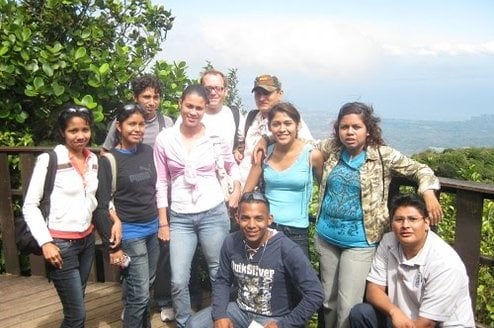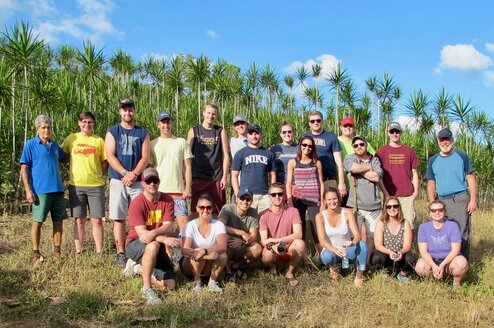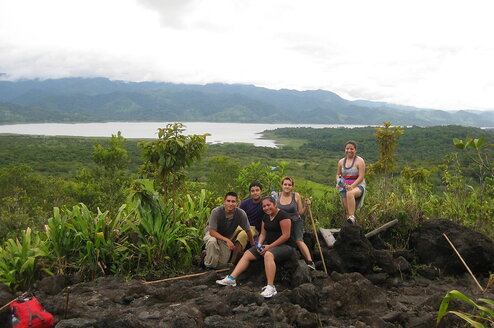Teach English in Nicaragua
Teaching Programs in Nicaragua
About
Over the last few years, Nicaragua has become an increasingly popular tourist destination. Consequently, the demand for English language learning has escalated. There are plenty of jobs available, particularly at language schools in the larger cities.
Nicaragua is a fascinating country to live and work in, with plenty of activities for teachers to enjoy on their weekends and vacation days. With the Caribbean on one side and the Pacific on the other, Nicaragua has superb beaches -- whether you are a surfer or simply want to chill out in a hammock. There are also opportunities to watch turtles nesting on both sides of the coast.
With lush jungles to explore and volcanoes to hike (or board down), Nicaragua is ideal for those with an adventurous spirit. The colonial cities of Granada and Leon are rich in culture and history, with great restaurants and a lively nightlife. Teaching English is the perfect way to experience "Nico" culture and enjoy all that this absorbing country has to offer.
In order to teach English in Nicaragua, most teachers will require TEFL certification. The average salary for teaching in Nicaragua is $500 - $700 per month.
Job Types
Language Schools
The majority of TEFL teachers work at one of the many language schools, which are located in the major cities of Nicaragua. Most of them only teach English. On average, teachers work five days a week and a day consists of five lessons, each of 45-50 minutes in duration. It's easier to secure jobs in language schools than any of the other institutions and they tend to accept applicants with fewer qualifications.
International Schools
The salary is higher at international schools, but more credentials are required. Typical hours are 9:00 am to 5:00 pm, five days per week. International schools provide instruction primarily in English and teachers come from all over the world, creating a very international environment. Students pay an annual fee and many local wealthier families place great importance on their children being educated at these kinds of schools. The American Nicaraguan School in Managua is the largest international school in the country.
Private Tutoring
It is possible to work in Nicaragua as a private tutor, which offers more flexibility and more personal interaction with locals. As long as you have a TEFL qualification, you can start by posting flyers in community centers and universities. Having business cards made up with Spanish on one side and English on the other will help get things underway. It's a good idea to offer discounts for multiple lessons. Please check with the Nicaraguan embassy in your home country to make sure you're abiding by immigration laws while doing this type of work.
Finding a Job
Although applying for a job in a foreign country is exciting, it can also be bewildering. Here is a look at what to expect when you apply for a job in Nicaragua.
When to Apply for Jobs in Nicaragua
Peak hiring times tend to be from February to March and July to August. There are, however, positions available year-round, so don't feel that you have to limit yourself to applying only during those periods.
How to Apply for Jobs in Nicaragua
Schools and agencies often recruit online, but sometimes it's mandatory to attend an interview in person. The recruitment process can occasionally be completed online, with a Skype interview being sufficient.
Finding a job while you are in Nicaragua is easier. Have a look at the websites of various schools and universities to find out if they are seeking TEFL teachers. Many schools aren't online, so it is worth going to visit to ask about potential vacancies.
Average Salary of Teaching Jobs in Nicaragua
Wages are low in Nicaragua, but so is the cost of living. Generally, teachers who work in language schools earn between $300-$600 per month. This may not seem like very much, but it's enough to live adequately in Nicaragua, albeit without much room for saving. Those who are able to secure a job in a university earn substantially more, sometimes up to $2,500 per month.
Qualifications Needed
A degree is preferred and most of the elite schools in Managua will insist on one, but many schools don't require one, especially language schools. A TEFL or TESOL certificate is a necessity and it can either be obtained prior to arriving in Nicaragua or when you are there. Some TEFL organizations offer job search support upon completion of the course, providing resources and guidance. Having previous experience teaching English can be an advantage.
Applicants from the English-speaking countries of U.S., Canada, UK, Ireland, Australia, New Zealand, and South Africa are often favored, but it's still worth applying if you are from elsewhere.
Need to Know
Before making a decision to pack your bags for the Caribbean climes of Nicaragua, here is the low-down on what teaching English in the Central American country involves:
Popular Destinations to Teach in Nicaragua
Most of the teaching opportunities are in larger cities such as Managua, Granada, Leon, and San Juan del Sur. The majority of jobs available are in the capital of Managua, a sprawling metropolis made up of numerous neighborhoods.
Granada and Leon are colorful colonial cities, each with a unique vibe of their own. San Juan del Sur is situated on the Pacific coast and is a mecca for surfers and a popular base for expats and tourists.
Visas
It is up to your employer to apply for a work visa on your behalf, although this can be a lengthy process. Many teachers in Nicaragua work illegally on a tourist visa and leave the county every 90 days to do a "visa run." This isn't advisable as there is always a chance that you could be found out and get deported.
Teacher Work Culture in Nicaragua
Integration is much easier for those who speak Spanish. For English teachers who wish to improve their Spanish skills, there are plenty of Spanish schools in the major cities where evening classes can be taken.
Dress is fairly conservative and a degree of formality is expected in the workplace. Shorts aren't acceptable attire in the classroom and cleanliness is very important.
If you are offered food or drink by students or colleagues, try to avoid saying no. Nicaraguans love to share and sharing food and drink is seen as a bonding exercise.
Classroom Etiquette in Nicaragua
Teachers from other countries often find that they have to adjust to a more laidback attitude towards time-keeping from their students. Nicaraguan concept of time is very different from other cultures and punctuality isn't highly valued. Classes are frequently canceled.
In universities, students dress smartly.
Health & Safety
Malaria is a risk in some parts of Nicaragua. It is best to check the situation prior to traveling to ascertain whether or not you will need to take anti-malarial pills. Hepatitis A and B are recommended, as are rabies and typhoid if you are staying for more than three months. Don't drink the water -- either filter it or buy bottled water.
Overall, Nicaragua is much safer than it's given credit for. Occasionally, foreigners are victims of petty theft or robbery, but chances of this happening are greatly reduced by using common sense. Keep personal items safe, don't carry too much cash, and be aware of your surroundings.
In recent months, there has been a spate of anti-government protests and looting triggered by a change to the social security system. Managua has been at the center of much of the violence, which has killed 300 people at the time of writing. Although foreigners should steer clear of protests, most of the country remains safe to travel. Please check your home country's State Department for accurate updates.




















